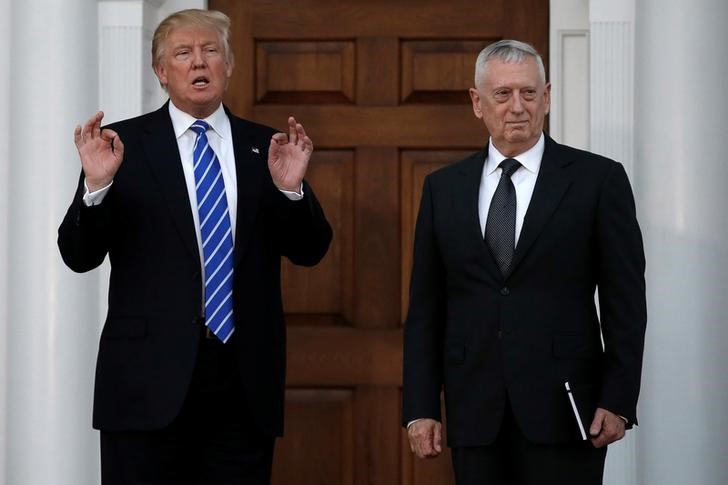By Phil Stewart
SIMI VALLEY, California (Reuters) - Often fiercely divided over policy, Republican and Democratic national security elite gathering this weekend in California appeared to largely agree on one thing: President-elect Donald Trump's pick for defense secretary.
James Mattis, a retired Marine general, is an unorthodox choice. Because he retired only in 2013, Mattis is technically ineligible for the job since he has not been a civilian for at least seven years.
That means Congress would need to grant a waiver -- something it hasn't done since 1950.
Democrat Leon Panetta, a former U.S. defense secretary critical of Trump, says it is worth it. He sees in Mattis a chance that a Trump administration would adhere to core alliances and principles, even ones challenged by Trump during his election campaign.
That would include U.S. support for NATO and recognition of longstanding threats, including from Russia.
"(Mattis) shares beliefs that have been at the heart and soul of protecting our national security for a long time," Panetta, who was also CIA director under President Barack Obama, told Reuters in an interview at the Reagan National Defense Forum.
Mattis, a 66-year-old commander who is revered by Marines, is known for his tough-talk, wariness of Iran and combat experience in Afghanistan and Iraq.
Although Trump has played up Mattis' "Mad Dog" nickname and tough-guy image, Marines and others who served with him portrayed Mattis as a scholar and strategist who would seek to avoid open conflict.
"I’ve never met anybody who tried harder to win without fighting," said Marine Corps Commandant Robert Neller.
"(He's someone) that understands information, relationships, how to negotiate, how to engage below the level of conflict. At the same time ... if you have to fight, ok, there's no way that we're not going to win."
It is unclear how much influence Mattis will have over Trump, who has also already named Michael Flynn, a retired Army lieutenant general, as his national security adviser. Flynn was also a close advisor during the 2016 campaign, adopting much of Trump's rhetoric.
For Mattis to be confirmed, the Senate and the House of Representatives both must pass a waiver exempting him from a law written to ensure that the military is under civilian command.
Legislators have granted such a waiver only once, in 1950, when Congress passed an act that allowed General George Marshall, who had retired in 1945, to serve as Pentagon chief.
But Marine General Joseph Dunford, the current chairman of the Joint Chiefs of Staff who serves as the president's top uniformed military advisor, flatly dismissed any concerns about having a recently retired general in the post, when asked at the forum.
"Do I have any concerns? No," said Dunford, who once counted Mattis as his commander.
Republican Dick Cheney, a former defense secretary and vice president, called Mattis a great choice.
Deputy Defense Secretary Robert Work told a small group of reporters who traveled with him to California that the support expressed at the forum for Mattis appeared to be bipartisan.
"Everyone has great confidence that he's going to be able to master the job, both sides of the aisle," should he get confirmed, Work said after the event.
Representative Mac Thornberry, the Republican who chairs the House Armed Services Committee, said he expected to start informal meetings on the waiver in the coming days. He hoped to settle the waiver issue before Trump's inauguration Jan. 20.
"We need a secretary of defense on the ground, running, as quickly as possible. At the same time, I don’t think it’s right to try to jam it through," Thornberry told Reuters.
"It needs a debate or discussion at least. But we need to do it early."
Some Democrats have raised concerns about civilian control of the military -- as well as having too many generals in the top tiers of the government.
Senator Kirsten Gillibrand, a Democrat on the Armed Services Committee, has said she would not back a waiver for Mattis.
Congresswoman Susan Davis, a Democrat on the House Armed Services Committee, said at the forum she wanted to learn more about Mattis.
But Panetta warned fellow Democrats against blocking him.

"Considering the other picks that (Trump) has made, this would be the wrong target," he said.